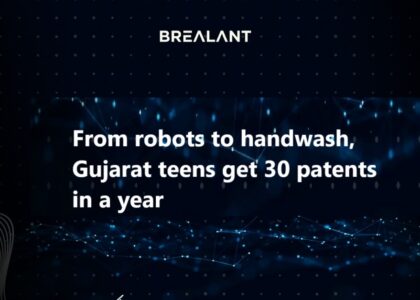

Should I Patent My App?
You have a great idea for a mobile app and are confident it will be successful. You’re about to launch the next Facebook. Snapchat’s successor. Then… you get the picture.
But, just as the lighting for your big idea goes off, you have another thinking… what if someone steals my app concept? What if someone else releases your app before you? What if an evil thief steals your brilliant app idea?
It turns out that the United States has a legal mechanism in place to prevent this from happening: the patent system. Patents are legal license that confers ownership over an idea or creation. If you have a new product, method, or process concept, you may protect it by submitting a patent. This patent grants you exclusive control over who manufactures or implements your idea, prot ecting your monetary stake in it. Once you obtain a patent, you may either use it solely, sell it fora single fee, or license it to a third party in exchange for royalties.
That’s all well and good. But how do patents apply to apps? Is a mobile app an invention?
Well… yes and no.
Do You Need a Patent for an App?
Before we get into whether or not you need a patent for your app concept, let’s define what you’d be patenting.
Because here’s the thing: a patent does not protect a mobile app in and of itself. A mobile app is just a long string of code. It is, in a literal sense, a document. Patents do not cover papers but rather concepts.
But, you say, what about the code? Is that secure?
Don’t be concerned. A separate set of rules merely governs it.
The code of your program, which is the physical manifestation of the product you’ve created, is truly protected under US Copyright law. This may appear contradictory, given that copyright law primarily protects creative creations. Is your app a piece of art?
It is in the eyes of the US government. Software, believe it or not, is protected by copyright, like a work of literature. Consider printing out the code for your mobile app and binding it like a book; this is what copyright protects. That’s a good thing because that means no one can wholesale clone your mobile app and get away with it.
A patent, on the other hand, is a very other beast.
When you file for a patent for your mobile app, you’re truly patenting a unique concept included within your app. This might be a new type of software process, new functionality that other applications haven’t done, or a new way your app employs to perform anything. Please take notice that the patent does not cover the mobile app itself. Instead, the patent covers a unique process within the mobile app; you are patenting the concept of that method.
Take, for example, Snapchat. Snapchat does not hold a patent on their app per se, but rather for specific, innovative aspects or developments inside their app.
Snapchat, for example, holds a patent for “Single-mode visual media capture,” which details the technology Snapchat utilizes to record photographs and videos with a single button.
“An electronic device includes digital image sensors to capture visual media, a display to present the visual media captured by the digital image sensors, and a touch controller to identify haptic contact engagement, haptic contact persistence, and haptic contact release on display,” according to the abstract. Furthermore, based on an evaluation of the period between the haptic contact engagement and the release, a visual media capture controller alternatively records the visual media as a photograph or a video.”
This patent essentially details how Snapchat allows users to hit a button to take a picture or hold the button to shoot a video. Please keep in mind that the patent does not cover anything linked to the Snapchat app. Instead, the patent covers the novel approach used by the Snapchat app.
Keeping this in mind, we’ll see that not all applications are patentable. Many app concepts, even the most popular ones, are very derivative. They take a lot of previously done features and functions, reorganize them in novel ways, and display them in a new app.
On a fundamental level, Uber and TaskRabbit are pretty similar: they’re both network-based apps that link customers who want something with users who can supply it. As a result, they couldn’t both get a patent for this, even though they’re distinct programs with different tasks servicing separate populations.
Some apps, though, will still be eligible for a patent. So, for example, if you are truly developing a mobile app that takes a unique approach or employs a novel technique, you may be eligible for a patent.
Should you patent your app concept?
Well… maybe.
Finally, it can’t harm. It’s a responsible step to take, and if you truly have a novel concept, it will prevent someone else from releasing it first. Therefore, if you believe that patenting your app concept is vital, we recommend that you do so.
However, we’ve discovered that it isn’t truly required for 99 percent of entrepreneurs. The fact is that most app concepts aren’t all that novel. What distinguishes a successful app from a failed one is a strong development process, a product that meets the demands of consumers, and excellent execution. You can’t patent that no matter how hard you try.
Our perspective on patents is similar to our perspective on NDAs. They are suitable in many situations, but they should not be the first thing that comes to mind. Get a patent if you’re certain your app has a wholly new procedure that no one has ever thought of before. However, if you believe you can get started without patenting the idea, we advocate putting something in front of people first. After all, you could discover that the unique procedure you were so thrilled about isn’t what your consumers want after all, in which case your patent will be useless.
How Much Does It Cost to Patent an App?
Here comes the difficult part. Unlike copyright, filing for (and receiving) a patent is not inexpensive.
Obtaining a provisional patent application is the first stage in patent filing. This acts as a marker to keep you in line with the patent office. It comprises a brief, high-level description of your app. While it does not guarantee a patent, it does imply that you will be protected if someone else seeks to patent the invention (your app) after you file a provisional application.
Provisional patent applications typically cost between $100 and $300. This is a huge reduction in the cost of a full patent (more on that later), but it’s also crucial to note that this is merely postponing the expense of the patent. Your provisional patent application will be valid for a year. If you do not file a patent application within that year, your provisional application will be lost.
So, how much does it cost to file a comprehensive patent application?
Err… a lot.
The real cost of a patent in the United States varies greatly, depending on the nature of the innovation and the intricacies involved. However, the charge is only the beginning. The government will charge between $400 and $800 in filing costs, but the most expensive aspect isn’t the government fees. It’s the attorneys.
Patent law, particularly software patent law, is mind-bogglingly complex. This implies that unless you have the professional legal knowledge, you will almost certainly be unable to file your patent on your own. Instead, you’ll need to employ an attorney.
The first stage is a patent search, which involves your lawyer searching the patent database to check if your new idea has already been patented. This is an important step that might cost between $2,000 and $3,000, depending on the nature of the application.
If the patent search yields positive results, you will proceed to the patent application procedure. Legal expenses for this procedure will vary greatly from app to app, depending on how complicated the technology is – but for a mobile app, legal fees can easily range from $5,000 to $16,000.
So, how much does a patent application cost from start to finish? In the provisional application, government filing costs, legal aid with filing, patent search, and patent application, a patent application for a mobile app should cost between $5,000 and $20,000 or more.
This is why we are hesitant to patent mobile apps. Yes, it makes sense, especially if you have venture capital, but patenting it is overkill if you’re starting with a concept. That money would be far better spent on a road trip. That way, if we need to, we can raise funds to submit a patent.








